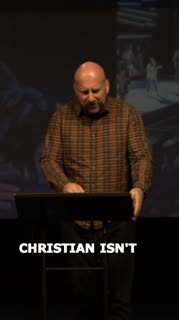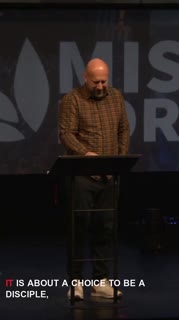Living Out Christian Identity Through Transformative Love
Devotional
Sermon Summary
Bible Study Guide
Sermon Clips
1. "Being a Christian isn't about checking a box on a sentence. It's not about being born into a family that would say, we're Christian, so you're Christian. Being born into a country that has traditionally seen itself as influenced and governed by Judeo-Christian ethics, so therefore this is somehow a Christian nation. No, that's not what it means to be a Christian. It's not, it's not, even about doing Christian activities. Getting baptized is not what makes you a Christian." ([00:09:06] (38 seconds)
)
2. "It is about a choice to be a disciple, to be an apprentice of Jesus, to identify with Jesus above all other identifications. And it starts with a confession of faith in who Jesus is and in what he has done for us. And so in Romans 10, 9, Paul says, hey, you want to know what a Christian, you want to know what a disciple of Jesus really is? It's this. It's one who confesses with their mouth that Jesus is Lord." ([00:09:52] (34 seconds)
)
3. "A Christian is merely one who has understood and received the love of God as presented to us in Christ Jesus. What is a Christian? It's someone who's received God's love through Christ. And then what does a Christian do? That's what we've been entering into last week and this week. What does a Christian do? The answer is, they love. They are ones who have been loved who love." ([00:13:54] (28 seconds)
)
4. "The number one evidence that you and I belong to God, John says, is love. We love, he says, because he first loved us. If we have been loved, we ought to love. We love because we are loved. Now, most of us, we have this default religious position and perspective that starts with this question, what do I need to do in order to make God love me?" ([00:19:29] (42 seconds)
)
5. "God doesn't love you because of what you have done for him. Because you checked a whole bunch of boxes for him. God's acceptance of you doesn't rest on you. It rests on not what you did, but what Christ has done on the cross. Our text from last week, it was also in 1 John 4 here. You can just scroll up. A few verses of verse 9." ([00:21:44] (30 seconds)
)
6. "Ultimately, the reason that love is central to what a Christian ought to do is because love is the foundation of what Christ has done for us. Your ability to love flows out of the reality that you have been loved. We don't love God to earn, we don't do things for God, we don't love God to earn His love, but because through Jesus, He demonstrated His love for us." ([00:22:42] (40 seconds)
)
7. "The proof that you've truly believed and received the love offered to you through Christ is that you are growing in love for others. Here's the good news. Because I know this is hard. Like, I know that loving people is difficult work, but Jesus provides us with the model of love and the means to love." ([00:30:22] (26 seconds)
)
8. "The reason that you and I, the reason that we assume a relationship with God must be I do things in order that you would love me is because to some extent, that's how every single relationship we have in this world with other people works. There is a dynamic that we can only love to a certain extent if we have not received love back from others." ([00:31:47] (27 seconds)
)
9. "Because of Jesus, we can love others sacrificially. Because of Jesus, we have to love others. We must love others tangibly. Yes, yes. Jesus was filled with compassion, and his heart broken. There's an emotional part to love, but at its core, when the Bible talks about love, it's not just talking about warm fuzzies." ([00:37:46] (25 seconds)
)
10. "A Christian is one who has believed the good news that God loves them so much that Jesus died and rose again to save them and the proof that they have got this good news of love is that they love others. So let me just give you and close off here with a call to action." ([00:41:33] (20 seconds)
)
Ask a question about this sermon
)
2. "It is about a choice to be a disciple, to be an apprentice of Jesus, to identify with Jesus above all other identifications. And it starts with a confession of faith in who Jesus is and in what he has done for us. And so in Romans 10, 9, Paul says, hey, you want to know what a Christian, you want to know what a disciple of Jesus really is? It's this. It's one who confesses with their mouth that Jesus is Lord." ([00:09:52] (34 seconds)
)
3. "A Christian is merely one who has understood and received the love of God as presented to us in Christ Jesus. What is a Christian? It's someone who's received God's love through Christ. And then what does a Christian do? That's what we've been entering into last week and this week. What does a Christian do? The answer is, they love. They are ones who have been loved who love." ([00:13:54] (28 seconds)
)
4. "The number one evidence that you and I belong to God, John says, is love. We love, he says, because he first loved us. If we have been loved, we ought to love. We love because we are loved. Now, most of us, we have this default religious position and perspective that starts with this question, what do I need to do in order to make God love me?" ([00:19:29] (42 seconds)
)
5. "God doesn't love you because of what you have done for him. Because you checked a whole bunch of boxes for him. God's acceptance of you doesn't rest on you. It rests on not what you did, but what Christ has done on the cross. Our text from last week, it was also in 1 John 4 here. You can just scroll up. A few verses of verse 9." ([00:21:44] (30 seconds)
)
6. "Ultimately, the reason that love is central to what a Christian ought to do is because love is the foundation of what Christ has done for us. Your ability to love flows out of the reality that you have been loved. We don't love God to earn, we don't do things for God, we don't love God to earn His love, but because through Jesus, He demonstrated His love for us." ([00:22:42] (40 seconds)
)
7. "The proof that you've truly believed and received the love offered to you through Christ is that you are growing in love for others. Here's the good news. Because I know this is hard. Like, I know that loving people is difficult work, but Jesus provides us with the model of love and the means to love." ([00:30:22] (26 seconds)
)
8. "The reason that you and I, the reason that we assume a relationship with God must be I do things in order that you would love me is because to some extent, that's how every single relationship we have in this world with other people works. There is a dynamic that we can only love to a certain extent if we have not received love back from others." ([00:31:47] (27 seconds)
)
9. "Because of Jesus, we can love others sacrificially. Because of Jesus, we have to love others. We must love others tangibly. Yes, yes. Jesus was filled with compassion, and his heart broken. There's an emotional part to love, but at its core, when the Bible talks about love, it's not just talking about warm fuzzies." ([00:37:46] (25 seconds)
)
10. "A Christian is one who has believed the good news that God loves them so much that Jesus died and rose again to save them and the proof that they have got this good news of love is that they love others. So let me just give you and close off here with a call to action." ([00:41:33] (20 seconds)
)










